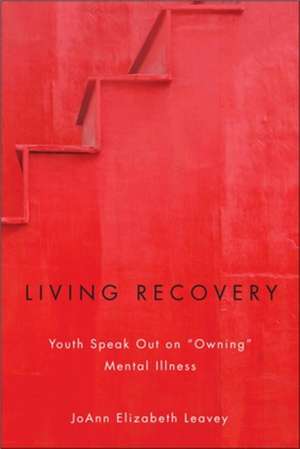Living Recovery: Youth Speak Out on "Owning" Mental Illness
Autor JoAnn Elizabeth Leaveyen Limba Engleză Paperback – 26 feb 2015
Preț: 152.75 lei
Nou
29.23€ • 30.46$ • 24.20£
Carte disponibilă
Livrare economică 13-27 martie
Specificații
ISBN-10: 1554589177
Pagini: 204
Dimensiuni: 152 x 228 x 15 mm
Greutate: 0.32 kg
Editura: Wilfrid Laurier University
Colecția Wilfrid Laurier University Press (CA)
Cuprins
Table of Contents for
Living Recovery: Youth Speak Out on âEURoeOwningâEUR? Mental Illness by JoAnn Elizabeth Leavey
Acknowledgements
Chapter One: Framing the Context for Youth with Mental Illness
Introduction
Terms Used in This Book
Who Is This Book For?
Redefining Our Understanding of Mental "Illness"
The Journey of Youth Through the Mental Health System
Framing the Context for Youth Living with Mental Illness
The Effects of a Mental Illness Diagnosis on Youth
Youth, Metaphor, and Mental Illness
Youth and the Social Construction of Mental Illness
The Significance and Direction of This Work
Summary
Chapter Two: How Do Youth Experience Mental Illness?
Prevalence of Mental Illness
Growing Up: Forming Identity and Developmental Tasks for Young People
Some Common Problems Experienced by Youth with Mental Illness
Summary
Chapter Three: Youth Participants: Who Are They?
Research Objectives
Why Use Qualitative Research?
The Interviews
Demographic Profile of Participants
My Impressions of Participants
Summary
Chapter Four: Youth Speak: Mental Health Experiences and Needs
Data Analysis: Emergency, Loss, Adaptation, and Recovery (ELAR)
What Do Youth Have to Say?
1. Emergence
2. Loss
3. Adaptation
4. Recovery
Summary
Chapter Five: Understanding: Integrating the Results
Integrating the Results and the Stages of Emergence, Loss, Adaptation, and Recovery
General Context
Developing Theory about Youth and Mental Illness: A Framework for Understanding
Considerations for Practice
The Stages of Emergence, Loss, Adaptation, and Recovery
Integration and Implications of Key Findings
Summary
Chapter Six: Where Are We and Where Do We Go from Here?
Gap in Service Delivery
Significance of Early Intervention
Implications and Suggestions for Testing the Theoretical Framework
Adaptation: A Conceptual Approach
Recovery and Wellness
Implications and Suggestions for Future Program and Policy Design
Limits and Benefits of This Research
Suggestions for Future Research
Conclusion
Appendix
References
Index







